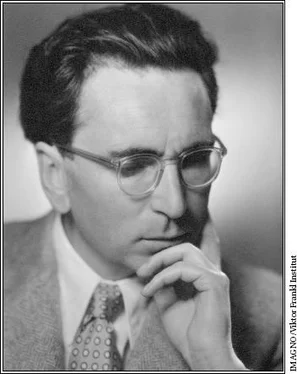II
LOGOTHERAPY
IN A NUTSHELL
READERS OF MY SHORT AUTOBIOGRAPHICAL STORY usually ask for a fuller and more direct explanation of my therapeutic doctrine. Accordingly I added a brief section on logotherapy to the original edition of From Death-Camp to Existentialism . But that was not enough, and I have been besieged by requests for a more extended treatment. Therefore in the present edition I have completely rewritten and considerably expanded my account.
The assignment was not easy. To convey to the reader within a short space all the material which required twenty volumes in German is an almost hopeless task. I am reminded of the American doctor who once turned up in my offce in Vienna and asked me, “Now, Doctor, are you a psychoanalyst?” Whereupon I replied, “Not exactly a psychoanalyst; let’s say a psychotherapist.” Then he continued questioning me: “What school do you stand for?” I answered, “It is my own theory; it is called logotherapy .” “Can you tell me in one sentence what is meant by logotherapy?” he asked. “At least, what is the difference between psychoanalysis and logotherapy?” “Yes,” I said, “but in the first place, can you tell me in one sentence what you think the essence of psychoanalysis is?” This was his answer: “During psychoanalysis, the patient must lie down on a couch and tell you things which sometimes are very disagreeable to tell.” Whereupon I immediately retorted with the following improvisation: “Now, in logotherapy the patient may remain sitting erect but he must hear things which sometimes are very disagreeable to hear.”
This part, which has been revised and updated, first appeared as “Basic Concepts of Logotherapy” in the 1962 edition of Man’s Search for Meaning .
Of course, this was meant facetiously and not as a cap- sule version of logotherapy. However, there is something in it, inasmuch as logotherapy, in comparison with psychoanalysis, is a method less retrospective and less introspective . Logotherapy focuses rather on the future, that is to say, on the meanings to be fulfilled by the patient in his future. (Logotherapy, indeed, is a meaning-centered psychotherapy.) At the same time, logotherapy defocuses all the vicious-circle formations and feedback mechanisms which play such a great role in the development of neuroses. Thus, the typical self-centeredness of the neurotic is broken up instead of being continually fostered and reinforced.
To be sure, this kind of statement is an oversimplification; yet in logotherapy the patient is actually confronted with and reoriented toward the meaning of his life. And to make him aware of this meaning can contribute much to his ability to overcome his neurosis.
Let me explain why I have employed the term “logotherapy” as the name for my theory. Logos is a Greek word which denotes “meaning.” Logotherapy, or, as it has been called by some authors, “The Third Viennese School of Psychotherapy,” focuses on the meaning of human existence as well as on man’s search for such a meaning. According to logotherapy, this striving to find a meaning in one’s life is the primary motivational force in man. That is why I speak of a will to meaning in contrast to the pleasure principle (or, as we could also term it, the will to pleasure ) on which Freudian psychoanalysis is centered, as well as in contrast to the will to power on which Adlerian psychology, using the term “striving for superiority,” is focused.
The Will to Meaning
Man’s search for meaning is the primary motivation in his life and not a “secondary rationalization” of instinctual drives. This meaning is unique and specific in that it must and can be fulfilled by him alone; only then does it achieve a significance which will satisfy his own will to meaning. There are some authors who contend that meanings and values are “nothing but defense mechanisms, reaction formations and sublimations.” But as for myself, I would not be willing to live merely for the sake of my “defense mechanisms,” nor would I be ready to die merely for the sake of my “reaction formations.” Man, however, is able to live and even to die for the sake of his ideals and values!
A public-opinion poll was conducted a few years ago in France. The results showed that 89 percent of the people polled admitted that man needs “something” for the sake of which to live. Moreover, 61 percent conceded that there was something, or someone, in their own lives for whose sake they were even ready to die. I repeated this poll at my hos- pital department in Vienna among both the patients and the personnel, and the outcome was practically the same as among the thousands of people screened in France; the difference was only 2 percent.
Another statistical survey, of 7,948 students at forty-eight colleges, was conducted by social scientists from Johns Hopkins University. Their preliminary report is part of a two-year study sponsored by the National Institute of Mental Health. Asked what they considered “very important” to them now, 16 percent of the students checked “making a lot of money”; 78 percent said their first goal was “finding a purpose and meaning to my life.”
Of course, there may be some cases in which an individual’s concern with values is really a camouflage of hidden inner conflicts; but, if so, they represent the exceptions from the rule rather than the rule itself. In these cases we have actually to deal with pseudovalues, and as such they have to be unmasked. Unmasking, however, should stop as soon as one is confronted with what is authentic and genuine in man, e.g., man’s desire for a life that is as meaningful as possible. If it does not stop then, the only thing that the “unmasking psychologist” really unmasks is his own “hidden motive”—namely, his unconscious need to debase and depreciate what is genuine, what is genuinely human, in man.
Existential Frustration
Man’s will to meaning can also be frustrated, in which case logotherapy speaks of “existential frustration.” The term “existential” may be used in three ways: to refer to (1) existence itself, i.e., the specifically human mode of being; (2) the meaning of existence; and (3) the striving to find a concrete meaning in personal existence, that is to say, the will to meaning.
Existential frustration can also result in neuroses. For this type of neuroses, logotherapy has coined the term “noögenic neuroses” in contrast to neuroses in the traditional sense of the word, i.e., psychogenic neuroses. Noögenic neuroses have their origin not in the psychological but rather in the “noölogical” (from the Greek noös meaning mind) dimension of human existence. This is another logotherapeutic term which denotes anything pertaining to the specifically human dimension.
Noögenic Neuroses
Noögenic neuroses do not emerge from conflicts between drives and instincts but rather from existential problems. Among such problems, the frustration of the will to meaning plays a large role.
It is obvious that in noögenic cases the appropriate and adequate therapy is not psychotherapy in general but rather logotherapy; a therapy, that is, which dares to enter the specifically human dimension.
Let me quote the following instance: A high-ranking American diplomat came to my offce in Vienna in order to continue psychoanalytic treatment which he had begun five years previously with an analyst in New York. At the outset I asked him why he thought he should be analyzed, why his analysis had been started in the first place. It turned out that the patient was discontented with his career and found it most diffcult to comply with American foreign policy. His analyst, however, had told him again and again that he should try to reconcile himself with his father; because the government of the U.S. as well as his superiors were “nothing but” father images and, consequently, his dissatisfaction with his job was due to the hatred he unconsciously harbored toward his father. Through an analysis lasting five years, the patient had been prompted more and more to accept his analyst’s interpretations until he finally was unable to see the forest of reality for the trees of symbols and images. After a few interviews, it was clear that his will to meaning was frustrated by his vocation, and he actually longed to be engaged in some other kind of work. As there was no reason for not giving up his profession and embarking on a different one, he did so, with most gratifying results. He has remained contented in this new occupation for over five years, as he recently reported. I doubt that, in this case, I was dealing with a neurotic condition at all, and that is why I thought that he did not need any psychotherapy, nor even logotherapy, for the simple reason that he was not actually a patient. Not every conflict is necessarily neurotic; some amount of conflict is normal and healthy. In a similar sense suffering is not always a pathological phenomenon; rather than being a symptom of neurosis, suffering may well be a human achievement, especially if the suffering grows out of existential frustration. I would strictly deny that one’s search for a meaning to his existence, or even his doubt of it, in every case is derived from, or results in, any disease. Existential frustration is in itself neither pathologi- cal nor pathogenic. A man’s concern, even his despair, over the worthwhileness of life is an existential distress but by no means a mental disease . It may well be that interpreting the first in terms of the latter motivates a doctor to bury his patient’s existential despair under a heap of tranquilizing drugs. It is his task, rather, to pilot the patient through his existential crises of growth and development.
Читать дальше












